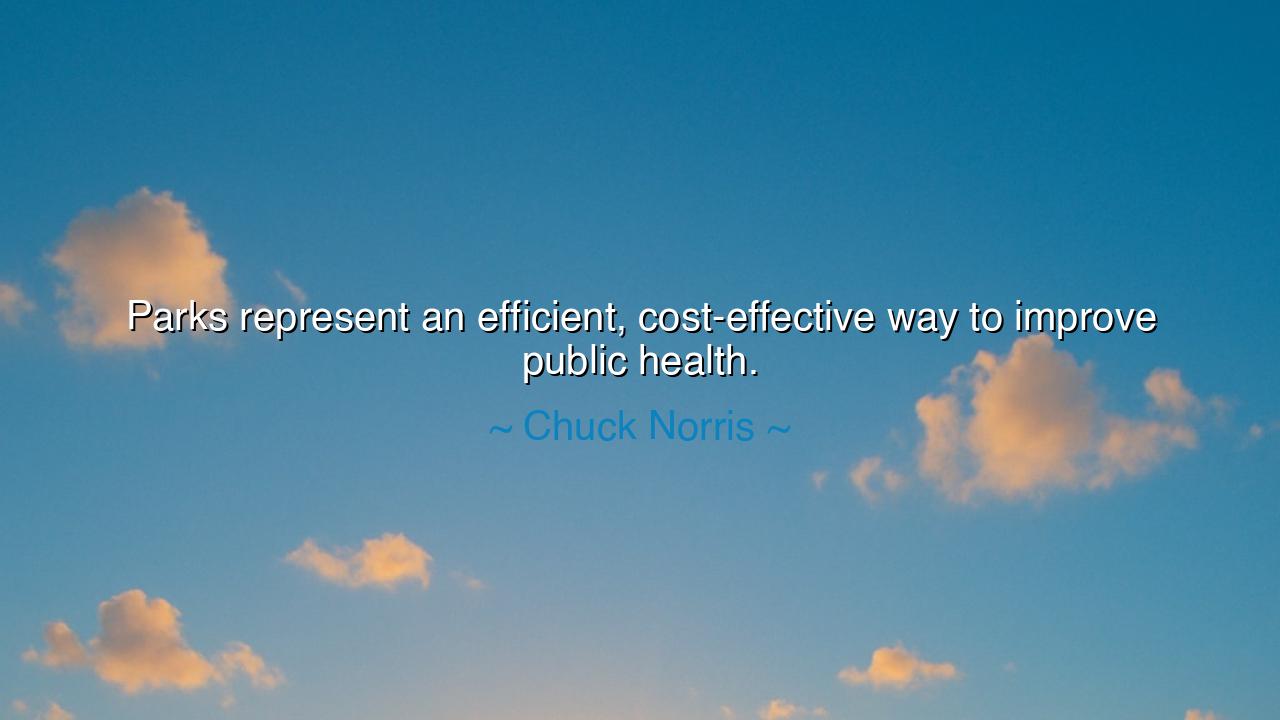
Parks represent an efficient, cost-effective way to improve






The words of Chuck Norris, “Parks represent an efficient, cost-effective way to improve public health,” carry a wisdom that echoes across ages — a truth both humble and profound. In a world obsessed with grand hospitals, expensive medicines, and artificial cures, Norris reminds us that nature herself offers healing that asks for no coin and demands no prescription. This is not merely a statement about urban planning; it is a call to remember the sacred bond between human vitality and the earth’s embrace.
In ancient times, the sages understood what many moderns have forgotten — that the body and spirit are nourished not only by food and rest, but by sunlight, wind, and the living pulse of creation. The Greeks built gymnasia beside groves of olive trees; the Chinese emperors designed gardens to mirror the balance of heaven and earth; and in the Roman Empire, public baths and open forums were spaces where both health and fellowship flourished. To walk beneath trees, to breathe the clean air of open space — these acts restore the weary soul and cleanse the body from the poisons of confinement.
Consider the tale of Frederick Law Olmsted, the visionary behind Central Park in New York City. In the 19th century, cities groaned under the weight of smoke, disease, and poverty. Olmsted saw what others did not — that a green sanctuary amid the iron chaos could heal both the lungs of the people and the heart of the nation. His park became a temple of nature in the heart of industry. There, rich and poor alike walked side by side, finding peace not in wealth but in the rhythm of birdsong and the rustle of leaves. What Olmsted built was more than a park; it was a public medicine, prescribed by vision and faith in the human need for nature.
The efficiency Norris speaks of is not the mechanical kind. It is the eternal economy of balance — the way a single tree cleanses the air for hundreds, or how a morning stroll may prevent a lifetime of illness. A park does not require the endless costs of hospitals or the sorrow of waiting rooms. It demands only care, sunlight, and the respect of those who tread upon its grass. In return, it gives strength to the body, clarity to the mind, and serenity to the soul.
In the stillness of a park, the heart beats in rhythm with the world once more. The noise of ambition fades; the tension in one’s chest dissolves like mist. The child running through open fields grows stronger not just in muscle but in spirit; the elder resting upon a bench rediscovers calm and dignity. These are not luxuries — they are the foundations of public health, available to all, shared without measure, and preserved by collective will.
Let us also remember the moral beneath this truth: when communities build parks, they build hope, equality, and endurance. A nation with open spaces values the health of its people over the hunger of profit. The park is a statement of faith — that citizens deserve beauty, peace, and vitality, not merely survival. To neglect such spaces is to surrender our humanity to walls of steel and the illusion of progress.
Therefore, my children of the modern age, let this teaching sink deep: go where the air moves freely, where green things grow, and where silence teaches peace. Support the planting of trees, the protection of public grounds, and the creation of gardens in every city. For in every blade of grass lies the promise of a healthier, kinder civilization. When we nurture the earth, the earth, in turn, nurtures us — and that, as Norris declares, is the most efficient healing of all.
So walk, breathe, and dwell in gratitude beneath the open sky. There, in the embrace of nature, you will find the ancient medicine of life itself — free, abundant, and ever waiting.






AAdministratorAdministrator
Welcome, honored guests. Please leave a comment, we will respond soon